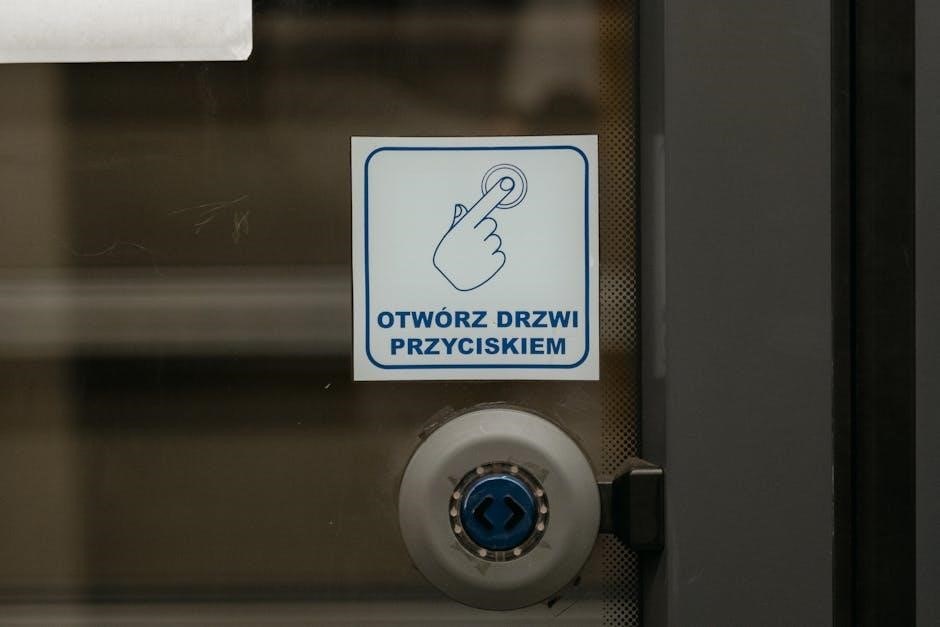The State of Connecticut Notary Public Manual is prepared by the Office of the Secretary of the State, revised in June 2020 with updated information and guidelines for notaries․
Overview of the Notary Public Role
The notary public is a public official appointed by the Secretary of the State, with the power to administer oaths, take acknowledgments and perform other duties as permitted by law․
The role of the notary public is to serve as an impartial witness to the signing of documents, verifying the identity of signers and ensuring that they are signing voluntarily․
This role is crucial in preventing fraud and ensuring the integrity of documents, and notaries must adhere to strict guidelines and protocols to maintain the trust and confidence of the public․
The notary public manual provides detailed information on the role and responsibilities of notaries, including their duties, powers and limitations, as well as the laws and regulations that govern their practice․
The manual is an essential resource for notaries, providing them with the knowledge and guidance they need to perform their duties accurately and effectively․
History of the Notary Public
The history of the notary public dates back to ancient civilizations, where notaries played a crucial role in verifying documents and witnessing signatures․
In the United States, the role of the notary public evolved over time, with each state developing its own laws and regulations governing the practice․
The notary public manual provides a brief overview of the history of the notary public, highlighting key milestones and developments that have shaped the role into what it is today․
The manual notes that the notary public has been an integral part of the state’s legal system for centuries, serving as a trusted and impartial witness to the signing of important documents․
The history of the notary public is a fascinating topic, and the manual provides a concise and informative overview of the subject, giving notaries a deeper understanding of their role and its significance․

Application for Appointment as a Notary Public
Applicants must submit required documents and fees to the Secretary of the State for notary public appointment in Connecticut through online process easily․
Application and Fee Requirements
The application process for a notary public in Connecticut involves submitting the required documents and fees to the Secretary of the State․ The fee for a new notary public appointment is specified, and applicants must also provide proof of identity and residency․ The application form must be completed accurately and thoroughly, with all required information and signatures․ The Secretary of the State reviews the application and verifies the information provided․ Once the application is approved, the applicant is appointed as a notary public and receives a commission certificate․ The certificate is valid for a specified term, and notaries must renew their commission prior to the expiration date․ The application and fee requirements are outlined in the Connecticut Notary Public Manual, which provides detailed instructions and guidelines for the application process․ The manual is available online for reference and review․
Commission and Certification
The commission and certification process for Connecticut notaries public is administered by the Secretary of the State․ Upon approval of the application, the notary public is issued a commission certificate, which is proof of their appointment․ The certificate includes the notary’s name, commission number, and expiration date․ Notaries are required to verify their identity and authenticity by signing their name as it appears on the certificate․ The commission certificate must be kept in a safe and secure location, and notaries must produce it upon request․ The certification process ensures that notaries are properly qualified and authorized to perform their duties․ The Connecticut Notary Public Manual provides detailed information on the commission and certification process, including the requirements and procedures for obtaining and maintaining a notary public commission․ The manual is a valuable resource for notaries public in Connecticut․

Remote Notarization in Connecticut
Public Act 23-28 allows remote notarization in Connecticut, effective October 1, 2023, with updated guidelines․
Public Act 23-28 and Remote Notarial Acts
The implementation of Public Act 23-28 has enabled remote notarization in Connecticut, allowing notaries to perform notarial acts remotely․ This act has been effective since October 1, 2023, and has brought significant changes to the notarization process․ The Notary Public Manual has been updated to include information on the implementation of Public Act 23-28, providing notaries with the necessary guidelines to perform remote notarizations․ The act aims to increase accessibility and convenience for individuals requiring notarization services․ With the updated manual, notaries can ensure they are complying with the new regulations and performing remote notarizations in accordance with the law․ The Office of the Secretary of the State has prepared the updated manual to assist notaries in understanding the new requirements and procedures for remote notarization․ This update is a significant development in the field of notarization in Connecticut․
Update to the Notary Public Manual
The Notary Public Manual has undergone an update to reflect changes in the law and regulations governing notarization in Connecticut․ This update is crucial in ensuring that notaries are aware of their roles and responsibilities․ The updated manual provides notaries with the necessary information to perform their duties in accordance with the law․ The Office of the Secretary of the State is responsible for preparing and revising the manual․ The update includes new information on remote notarization, as well as other changes to the notarization process․ Notaries are expected to familiarize themselves with the updated manual to ensure compliance with the law․ The updated manual is an essential resource for notaries, providing them with the guidance they need to perform their duties effectively․ The manual is revised periodically to reflect changes in the law and regulations․

Resources for Connecticut Notaries
Connecticut notaries can access various resources online through official state websites and manuals for guidance and support always available to them easily online now․

State of Connecticut Notary Public Manual
The State of Connecticut Notary Public Manual is a comprehensive guide prepared by the Office of the Secretary of the State, providing notaries with essential information and guidelines to perform their duties effectively․ The manual is revised periodically to reflect changes in laws and regulations, ensuring that notaries are aware of their responsibilities and obligations․ It covers various topics, including the role and duties of a notary public, application and appointment procedures, and remote notarization guidelines․ The manual is an invaluable resource for Connecticut notaries, offering them a clear understanding of their powers and limitations, as well as best practices for maintaining the integrity of notarized documents․ By following the manual’s guidelines, notaries can ensure that they are providing accurate and reliable services to the public, while also upholding the highest standards of professionalism and ethics․
Office of the Secretary of the State
The Office of the Secretary of the State is responsible for overseeing the notary public program in Connecticut, including the preparation and revision of the State of Connecticut Notary Public Manual․ The office is led by the Secretary of the State, who is appointed by the Governor and plays a crucial role in ensuring the integrity of the notary public system․ The office provides guidance and support to notaries, as well as investigates complaints and takes disciplinary action when necessary․ The Office of the Secretary of the State also maintains a database of all notaries public in the state, allowing the public to verify the status of a notary․ By regulating the notary public profession, the office helps to protect the public and maintain confidence in the notarization process, which is essential for a wide range of transactions and documents․
